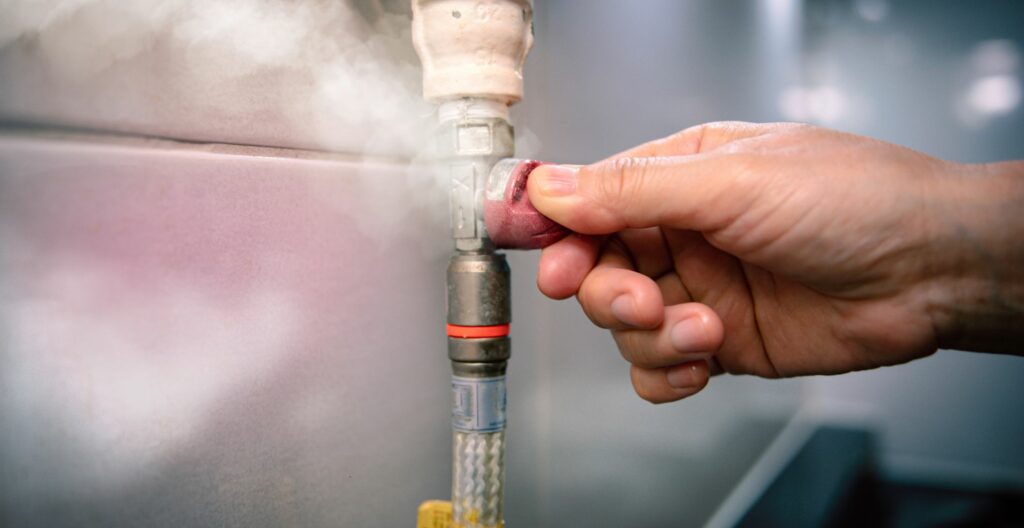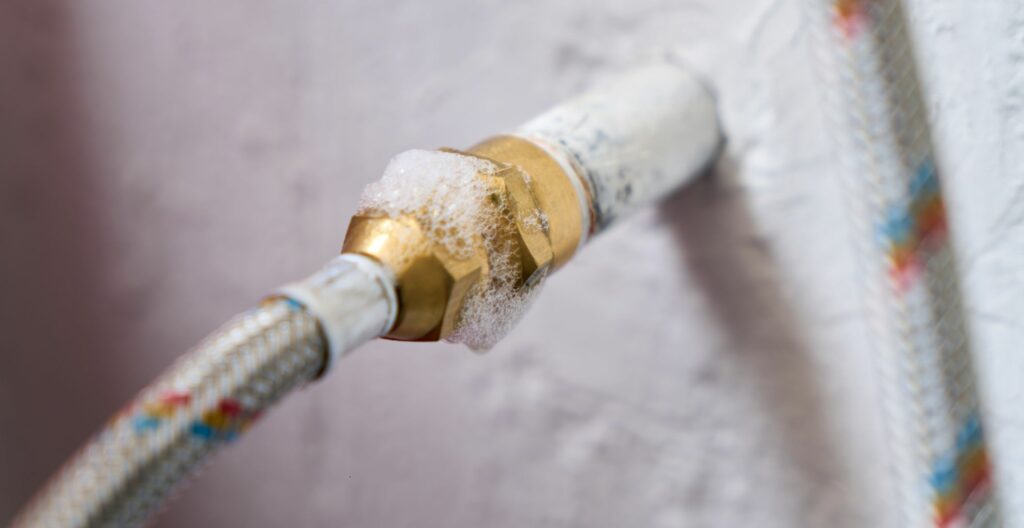
Open 24/7! Servicing all of Sydney’s Eastern Suburbs
Our Average Response time is: 1hr 53min 47sec
Gas leaks can be dangerous. Even the smallest leaks can impact your health and pose a fire hazard. However, they can also be tricky to detect.
Let's explore why you should never ignore a suspected gas leak, the common signs of a leak and what to do if you smell gas. By addressing a leak as soon as it's detected you can ensure your family and property are protected.
A gas leak means gas is escaping from lines or connections, appliances or the gas meter. You may also have an underground gas leak in the infrastructure that brings natural gas into your home. You can't see the gas, but you may be able to smell it as a chemical is added to gas to give in a distinct odour similar to rotten eggs.
An LPG or natural gas leak can be caused by a faulty gas appliance, damage to the lines or connections or even corrosion.

In Australia, there are two types of gas. LPG is stored in cylinders or tanks and delivered to homes and businesses as needed. Natural gas is distributed via underground pipelines. Both are widely used in Australian homes and businesses.
Gas leaks pose significant risks, not just to property but also to health.
1 - Gas leaks can be fatal
Gas leaks often cause physical symptoms, particularly in the case of faulty appliances like heaters. If you experience symptoms such as dizziness, nausea, confusion or shortness of breath, turn off your gas appliance immediately and contact professional leak detection services to address your gas-related concerns. Prolonged exposure to gas leakage can cause carbon monoxide poisoning, which can be fatal.
2 - They pose a serious fire hazard
Gas is extremely flammable. Once it escapes into the air, it can easily ignite and cause an explosion or fire. The sooner you detect a gas leak, the faster you can act to keep your family, belongings and neighbourhood safe.
3 - Gas leaks are costly
Leaks can cause premature wear and tear to expensive gas infrastructure and appliances, significantly reducing their lifespan. The early detection of leaks means you can act faster to repair the problem before it has a chance to become more serious. Gas leaks can also lead to unnecessarily high gas bills.
4 - Fixing a gas leak is a legal obligation
Gas leaks can lead to fires, property damage and loss of life. Therefore, a property owner must ensure they take reasonable steps to address any gas leaks as soon as possible. In all Australian states, a landlord must provide safe, working amenities and organise repairs as soon as practically possible. Being proactive about gas safety ensures you provide tenants with a safe environment in which to reside.
Gas leak detection can be difficult if you don't know what to look for. These are the most common signs of a leak in gas lines and gas appliances that you should be aware of.
Distinct smell
Gas is odourless. However, chemicals are added to natural gas and LPG to make gas leak detection easier. If you smell a distinct, unpleasant odour like rotten eggs or sulphur, it's a telltale sign there is a problem with your gas system.
Hissing sound
A hissing noise near gas lines or appliances indicates that the gas is escaping, and you should take immediate action.
Dead vegetation
When gas is escaping from underground gas lines it deprives the soil and plants of oxygen, causing them to die. If you observe dead or limp plants in a concentrated area close to your natural gas supply infrastructure, you should act quickly.
Bubbles in water
An underground gas leak can cause the ground to become saturated. If bubbles appear in standing water including puddles, plumbing or outdoor water features, it may be caused by a gas leak and you should investigate further.
Physical symptoms
According to Poison Control, the lack of oxygen due to a gas leak can cause many different sorts of physical symptoms including vomiting, nausea, headaches, dizziness and confusion. These physical symptoms of a gas leak can easily be confused for common ailments, such as a cold or the flu. If you experience any of these symptoms, get some fresh air to see if your condition improves. If multiple people experience these symptoms simultaneously, contact emergency services.
Issues with pilot lights
Keeping an eye on pilot lights can help you detect gas leaks. If they light but frequently go out, it can indicate a leaky gas line.
Increased gas consumption
Regularly checking gas usage at your gas meter can help with the early detection of gas leak issues.
Higher gas bills that aren't caused by additional gas appliances can indicate a gas leak and you should contact a licensed gas fitter immediately to investigate the problem. Here's how to read your gas meter.
If you suspect a gas leak, evacuate the premises and move to a safe location. Contact emergency services immediately by calling 000.

Gas is highly flammable. Avoid using electrical appliances because any spark can ignite gas and cause an explosion. Turn electrical devices off at the electrical switches and avoid using electronic devices like mobile phones. Do not use an open flame like that from a candle or lighter if you suspect a gas leak.
Open windows and doors to help disperse gas and reduce the risk of an explosion or fire and contact professionals to detect the source of the leak. Let your neighbours know of the potential gas leak so that they can also take precautions.
To ensure all gas infrastructure and appliances are safe to operate and it's OK to return to the premises, you must have the leak repaired by a licensed gas fitter. You should also notify your gas distributor, especially if you suspect the leak is coming from your gas meter.
A gas detector can alert you to potential hazards caused by gas leak issues. A gas detector is similar in price and size to a carbon monoxide detector, which does not detect natural gas leaks. They measure the concentration of gas in the air and sound an alarm when gas is detected. Just as homes are fitted with smoke alarms, these life-saving devices can add an extra level of protection for your home and family.
If you suspect a leak in a visible gas line or connection such as in an LPG barbecue, you can perform a soapy water test before you use it. You can find more information on how to perform a soapy water test on a gas bottle on the ELGAS website.
Regular maintenance will keep gas appliances clean, reducing the chance of a gas leak. Check for corrosion, ensure the connections are tight and have ageing lines replaced as necessary. Other tasks to help you prevent gas leaks, reduce gas bills and extend the life of your gas appliances include:
With suspected gas leaks, time is of the essence. At Plumberoo, our expert gas plumbers can be at your home quickly to detect gas leaks, repairing the problem fast and affordably to ensure your home is safe again. With 24/7 service, a highly experienced and professional team and reliability guaranteed, it's no wonder we've earned a reputation as Sydney's leading plumbing company.
From detecting gas leaks to performing routine gas system repairs and installations, you can rely on Plumberoo to be there when you need us. Call us today on (02) 9191 8787 or save our number into your phone so that you can contact us quickly should you require our emergency gas leak detection service.
When you detect a gas leak, you must not use an open flame, electronic devices or switches. Ensure proper ventilation by opening windows and doors and removing yourself from the environment immediately. Call a professional to find the exact location of your gas leak and repair the gas system safely.
The two most common signs of a gas leak are a hissing sound caused by gas escaping and a distinct smell.
Regular maintenance by a licensed and qualified professional can help you avoid gas leaks as they can check components for signs of wear and tear. This helps keep your home safe, reduces gas bills and extends the life of appliances.